Reabsorption, active transport, secretion, salt pumping by the loop of henle and filtration are all selective process in the nephron. Which process in the nephron is least selective?
Which Process In The Nephron Is Least Selective. This happens in the active section of the kidney called the nephron there are thousands of these in each. Which of the following processes of osmoregulation by the kidney is the least from bio 101 at universidad católica boliviana So for this question, filtration is actually the least selective because it�s a mass movement of water and salutes. The car hood was heated by the process of ___ and your hand was warmed by the process of____ radiation, conduction
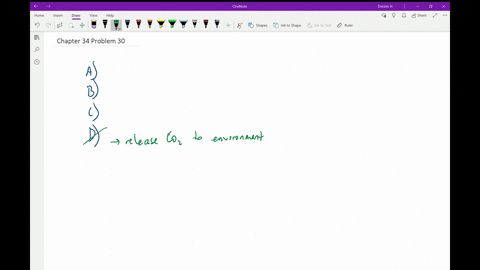 Solved:which Process In The Nephron Is Least Selective? A. Filtration B. Reabsorption C. Active Transport D. Secretion From numerade.com
Solved:which Process In The Nephron Is Least Selective? A. Filtration B. Reabsorption C. Active Transport D. Secretion From numerade.com
Related Post Solved:which Process In The Nephron Is Least Selective? A. Filtration B. Reabsorption C. Active Transport D. Secretion :
Which process of the nephron is least selective? The rest of the tubule is responsible for the selective reabsorption of glucose, some salts, and lots of the water. A) filtration b) reabsorption c) active transport d) secretion hormones secreted by the posterior pituitary gland are made in the _____. They have many blood vessels associated with them.
The collecting duct is responsible for the selective reabsorption of water and.
A) cerebellum b) thalamus c) hypothalamus d) medulla oblongata Reabsorption, active transport, secretion, salt pumping by the loop of henle and filtration are all selective process in the nephron. Amongst the given options filtration is the least selective process in the nephron. Which of the following is a non selective process? Filtration you place your hand on a black car hood in bright summer sunshine. \begin {array} {ll} {\text { (a) filtration }} & {\text { (c) active transport }} \ {\text { (b) reabsorption }} & {\text { (d) secretion }}\end {array} problem.
 Source: quizlet.com
Source: quizlet.com
The process of the kidney taking out the impurities from the blood? Reabsorption, active transport, secretion and salt pumping by the loop of henle are highly selective. Which type of nephron is most common?
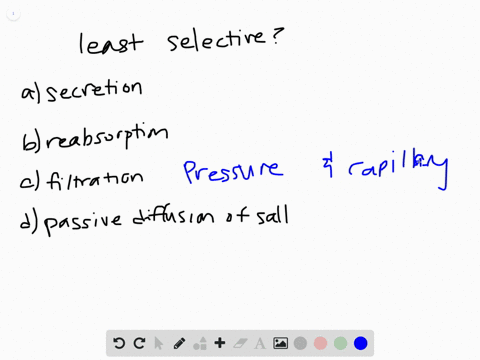 Source: numerade.com
Source: numerade.com
Each nephron removes a small amount of filtrate from the blood and then converts it into a much smaller amount of urine. Salmon in fresh water c. All of the following processes occur in the nephron of the kidney except _ blood cell formation as filtrate passes through the long loop of henle, salt is removed and concentrated in the interstitial fluid of the kidney medulla.
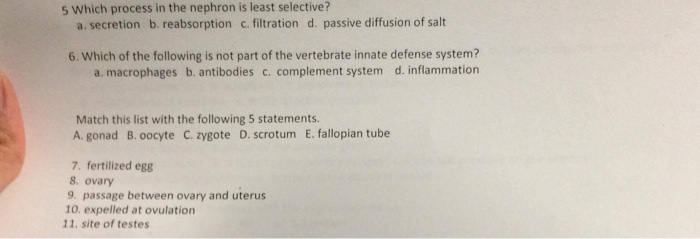
Problem 3 which of the following animals generally has the lowest volume of urine production? Urine formation begins with glomerular filtration, which is a non selective process in which fluids and solutes are forced through a membrane by hydrostatic pressure. Which process in the nephron is least selective?
 Source: doubtnut.com
Source: doubtnut.com
Which of the following animals generally has the lowest volume of urine production? Reabsorption, active transport, secretion and salt pumping by the loop of henle are highly selective. While the other options that were presented are more selective about what�s being removed from the fill trait,
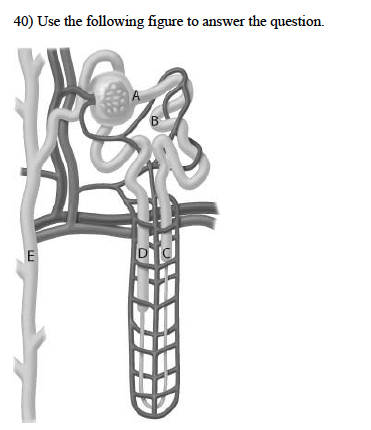 Source: easynotecards.com
Source: easynotecards.com
Natural selection should favor the highest proportion of juxtamedullary nephrons in which of the following species? Chapter 25, problem 9tyk is solved. Which process in the nephron is least selective?
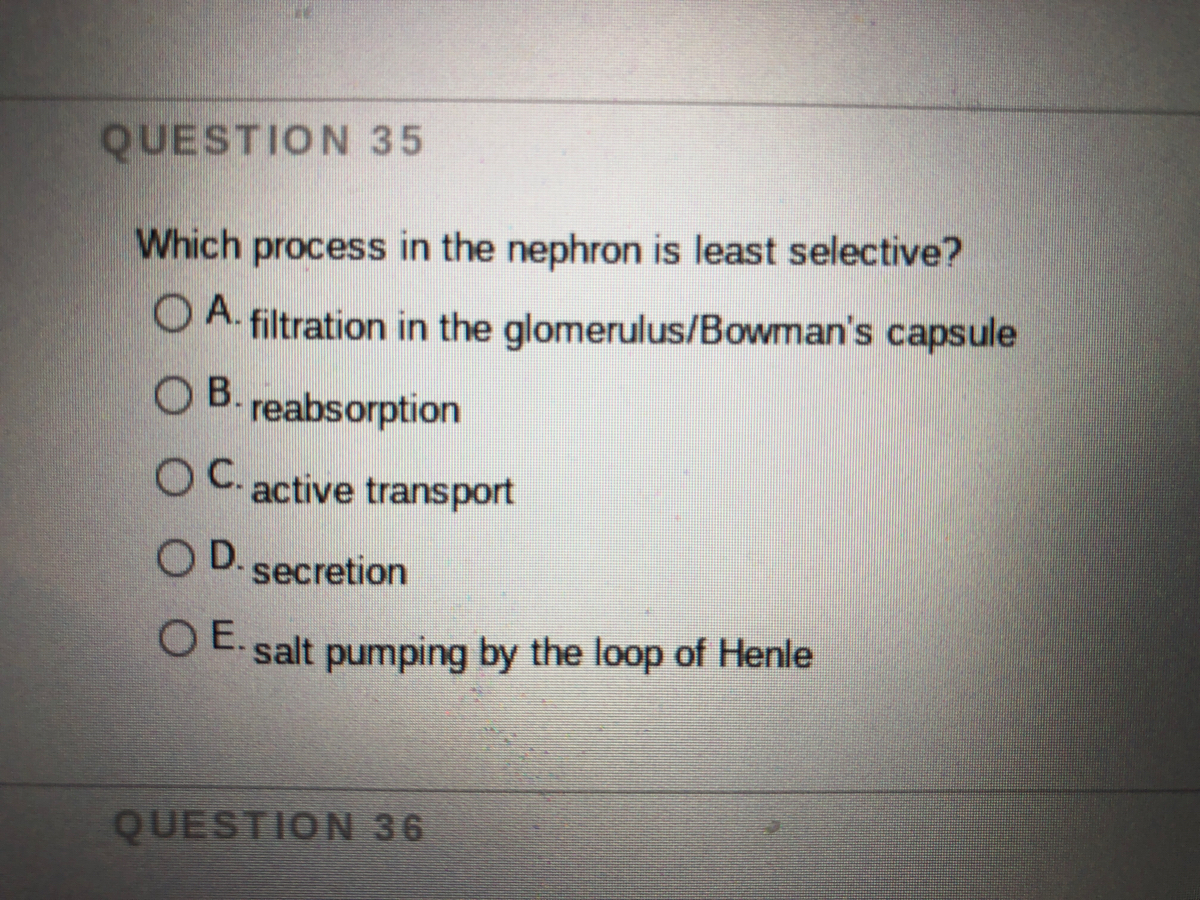 Source: bartleby.com
Source: bartleby.com
Reabsorption, active transport, secretion, salt pumping by the loop of henle and filtration are all selective process in the nephron. Which of the following animals generally has the. Urine formation begins with glomerular filtration, which is a non selective process in which fluids and solutes are forced through a membrane by hydrostatic pressure.
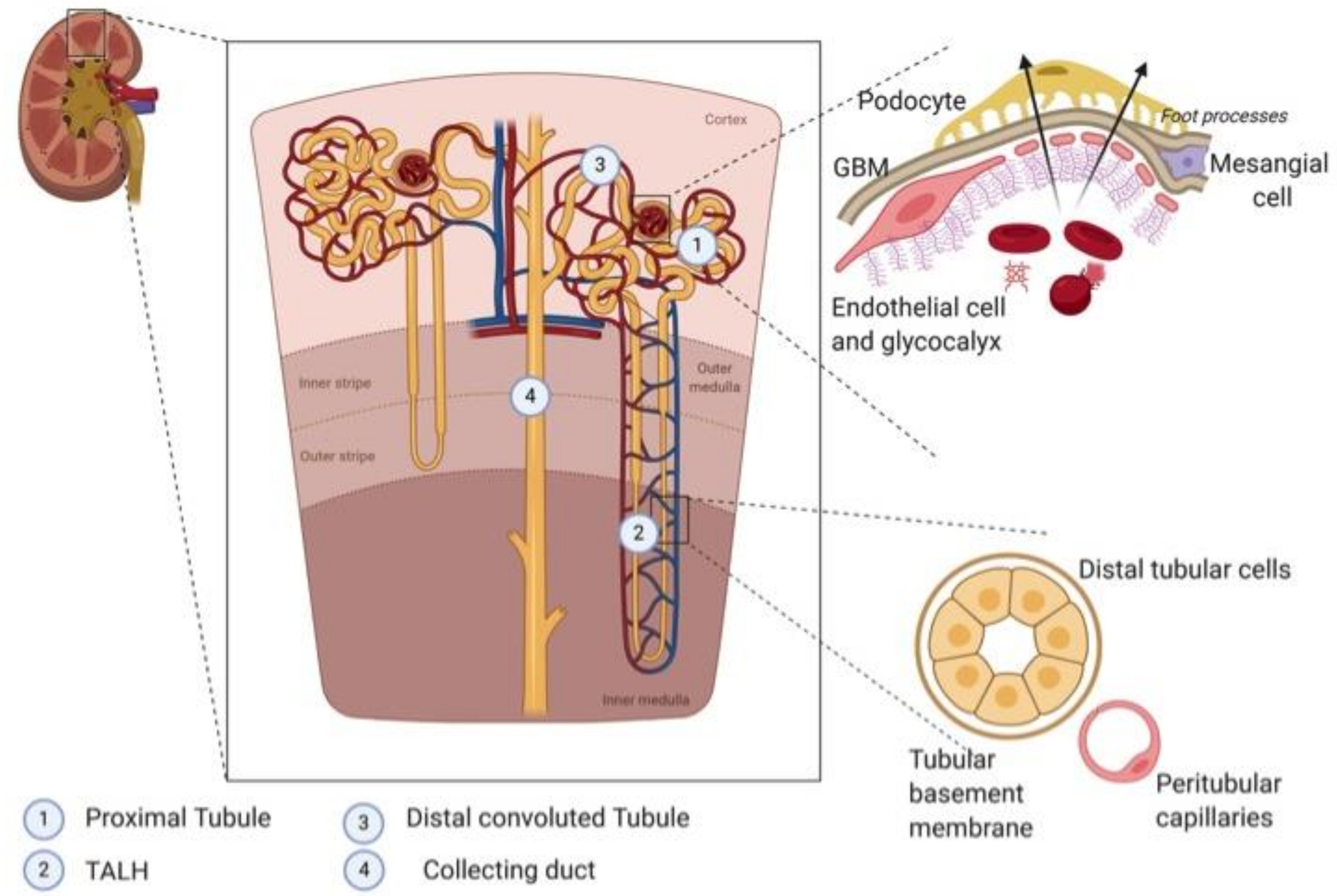 Source: mdpi.com
Source: mdpi.com
The car hood was heated by the process of ___ and your hand was warmed by the process of____ radiation, conduction Reabsorption, active transport, secretion, salt pumping by the loop of henle and filtration are all selective process in the nephron. Which process in the nephron is least selective?
 Source: coursehero.com
Source: coursehero.com
Amongst the given options filtration is the least selective process in the nephron. Which process in the nephron is least selective? A.) filtration b.) reabsorption c.) active transport d.) secretion e.) salt pumping by the loop of henle
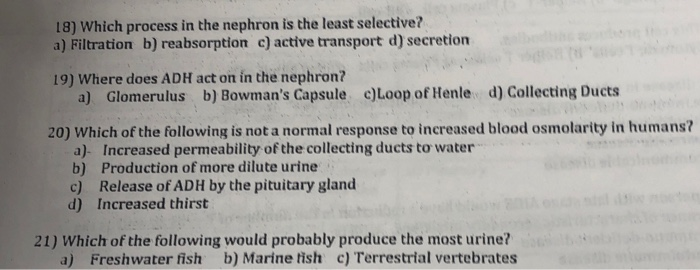 Source: chegg.com
Source: chegg.com
All of the following processes occur in the nephron of the kidney except _ blood cell formation as filtrate passes through the long loop of henle, salt is removed and concentrated in the interstitial fluid of the kidney medulla. A) active transport b) secretion c) salt pumping by the loop of henle d) reabsorption e) filtration $$\begin{array}{ll}{\text { (a) filtration }} & {\text { (c) active transport }} \ {\text { (b) reabsorption }} & {\text { (d) secretion }}\end{array}$$
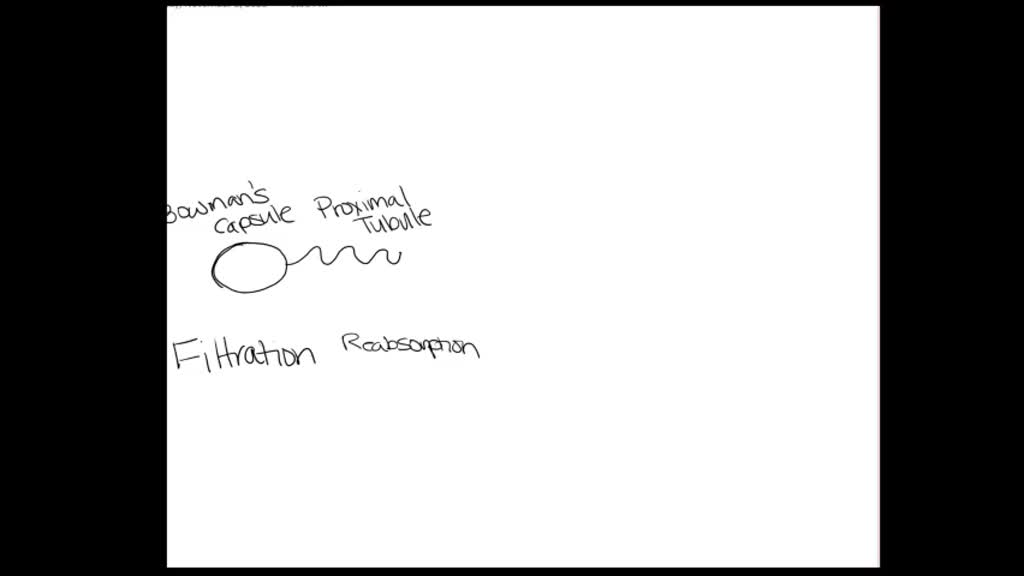 Source: numerade.com
Source: numerade.com
47 which process in the nephron is least selective a filtration b reabsorption c from biology 102 at claflin university Which process in the nephron is least selective? Which of the following animals generally has the lowest volume of urine production?
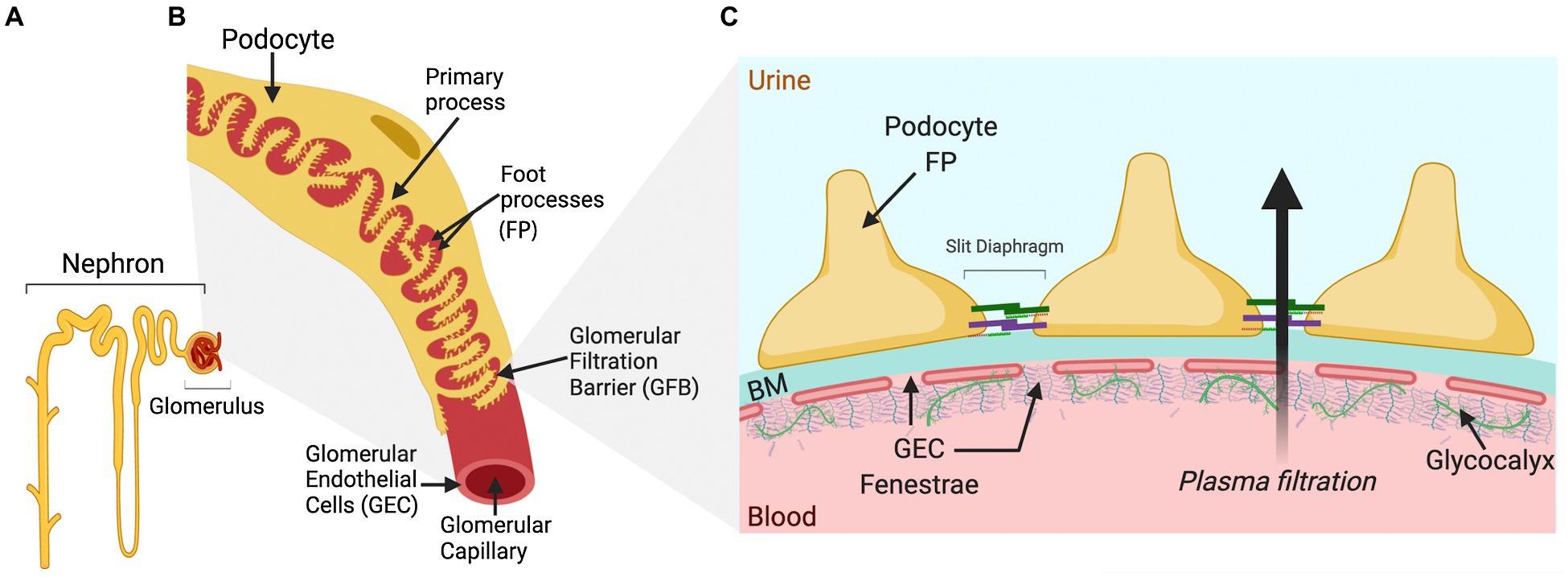 Source: frontiersin.org
Source: frontiersin.org
All of the following processes occur in the nephron of the kidney except _ blood cell formation as filtrate passes through the long loop of henle, salt is removed and concentrated in the interstitial fluid of the kidney medulla. Amongst the given options filtration is the least selective process in the nephron. A) filtration b) reabsorption c) active transport d) secretion
 Source: clutchprep.com
Source: clutchprep.com
All of the following processes occur in the nephron of the kidney except _ blood cell formation as filtrate passes through the long loop of henle, salt is removed and concentrated in the interstitial fluid of the kidney medulla. Solved:which process in the nephron is least selective? \begin {array} {ll} {\text { (a) filtration }} & {\text { (c) active transport }} \ {\text { (b) reabsorption }} & {\text { (d) secretion }}\end {array} problem.
 Source: coursehero.com
Source: coursehero.com
The collecting duct is responsible for the selective reabsorption of water and. So for this question, filtration is actually the least selective because it�s a mass movement of water and salutes. A.) filtration b.) reabsorption c.) active transport d.) secretion e.) salt pumping by the loop of henle
 Source: kidney-international.org
Source: kidney-international.org
Which process in the nephron is least selective? Salmon in fresh water c. \begin {array} {ll} {\text { (a) filtration }} & {\text { (c) active transport }} \ {\text { (b) reabsorption }} & {\text { (d) secretion }}\end {array} problem.
 Source: ahajournals.org
Source: ahajournals.org
A) active transport b) secretion c) salt pumping by the loop of henle d) reabsorption e) filtration Filtration you place your hand on a black car hood in bright summer sunshine. While the other options that were presented are more selective about what�s being removed from the fill trait,
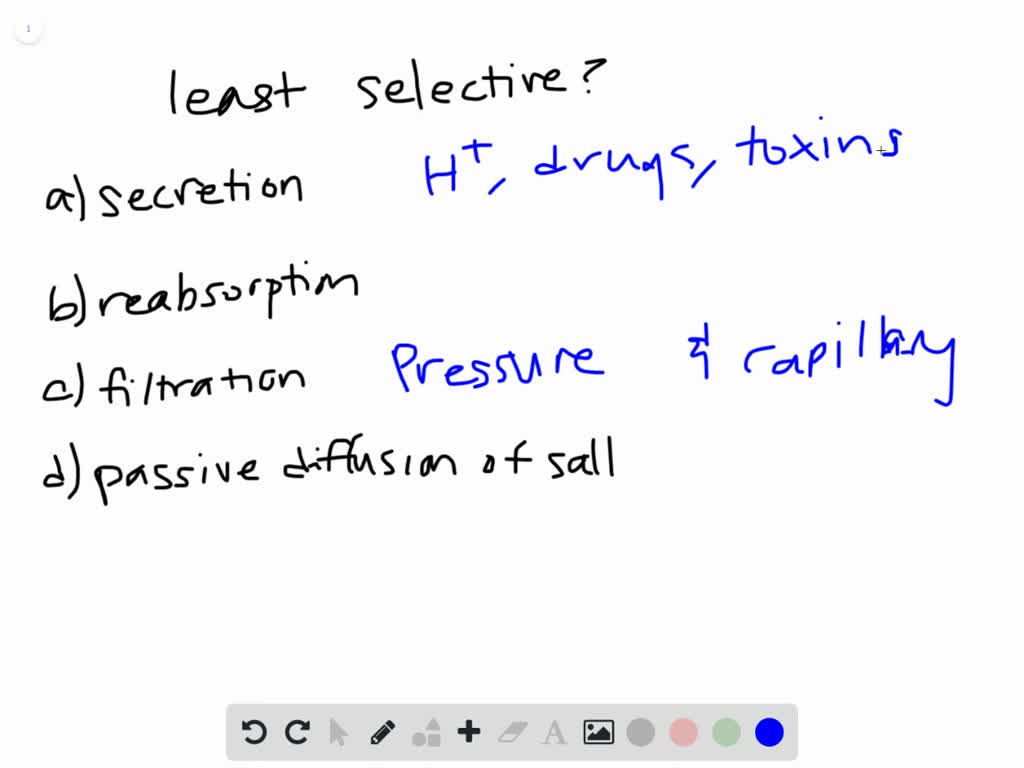 Source: numerade.com
Source: numerade.com
Which process in the nephron is least selective? Which of the following animals generally has the lowest volume of urine production? Which process in the nephron is least selective?
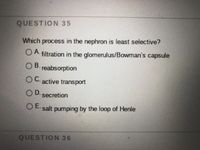 Source: bartleby.com
Source: bartleby.com
Nephrons are the tiny tubules that make up the kidneys. Which process of the nephron is least selective? The rest of the tubule is responsible for the selective reabsorption of glucose, some salts, and lots of the water.
 Source: ajkd.org
Source: ajkd.org
They have many blood vessels associated with them. Which process in the nephron is least selective? While the other options that were presented are more selective about what�s being removed from the fill trait,
 Source: numerade.com
Source: numerade.com
Urine formation begins with glomerular filtration, which is a non selective process in which fluids and solutes are forced through a membrane by hydrostatic pressure. Which process in the nephron is least selective? Which process in the nephron is least selective?
 Source: khanacademy.org
Source: khanacademy.org
And so this process ensures that there�s enough water and salutes being retained for the other processes of the body. Which process in the nephron is least selective? The kidneys clean the blood by a process of ultra filtration and selective re absorption.
Also Read :





